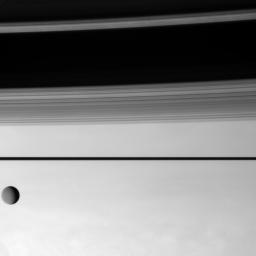
|
Icy Interloper
- Click the image above for a larger view
- Full-Res JPEG (1002 x 1002) (41.8 kB)
- Full-Res TIFF (1002 x 1002) (1.0 MB)
Caption:
Rhea enters the Cassini spacecraft's field of view and glides lazily across the scene as the spacecraft observes Saturn's restless atmosphere.
Rhea is 1,528 kilometers (949 miles) across.
This view looks toward the unilluminated side of the rings from less than a degree above the ringplane. The rings form a dark line across center and cast shadows onto the northern half of this view. The A ring and B ring cast the darker shadows compared to the C ring and the Cassini division, which are less dense.
The image was taken with the Cassini spacecraft narrow-angle camera on Aug. 13, 2007 using a spectral filter sensitive to wavelengths of infrared light centered at 750 nanometers. The view was obtained at a distance of approximately 4.1 million kilometers (2.5 million miles) from Saturn. Image scale is 24 kilometers (15 miles) per pixel on Saturn and 21 kilometers (13 miles) per pixel on Rhea.
Background Info:
The Cassini-Huygens mission is a cooperative project of NASA, the European Space Agency and the Italian Space Agency. The Jet Propulsion Laboratory, a division of the California Institute of Technology in Pasadena, manages the mission for NASA's Science Mission Directorate, Washington, D.C. The Cassini orbiter and its two onboard cameras were designed, developed and assembled at JPL. The imaging operations center is based at the Space Science Institute in Boulder, Colo.
For more information about the Cassini-Huygens mission visit http://saturn.jpl.nasa.gov/home/index.cfm . The Cassini imaging team homepage is at http://ciclops.org .
Cataloging Keywords:
| Name | Value | Additional Values |
|---|---|---|
| Target | Rhea | A Ring, Cassini Division, Saturn, Saturn Rings |
| System | Saturn | |
| Target Type | Satellite | Gap, Planet, Ring |
| Mission | Cassini-Huygens | |
| Instrument Host | Cassini Orbiter | |
| Host Type | Orbiter | |
| Instrument | Imaging Science Subsystem (ISS) | |
| Detector | Narrow Angle Camera | |
| Extra Keywords | Atmosphere, Grayscale, Infrared, Shadow, Visual, Wave | |
| Acquisition Date | ||
| Release Date | 2007-10-05 | |
| Date in Caption | 2007-08-13 | |
| Image Credit | NASA/JPL/Space Science Institute | |
| Source | photojournal.jpl.nasa.gov/catalog/PIA09743 | |
| Identifier | PIA09743 | |
